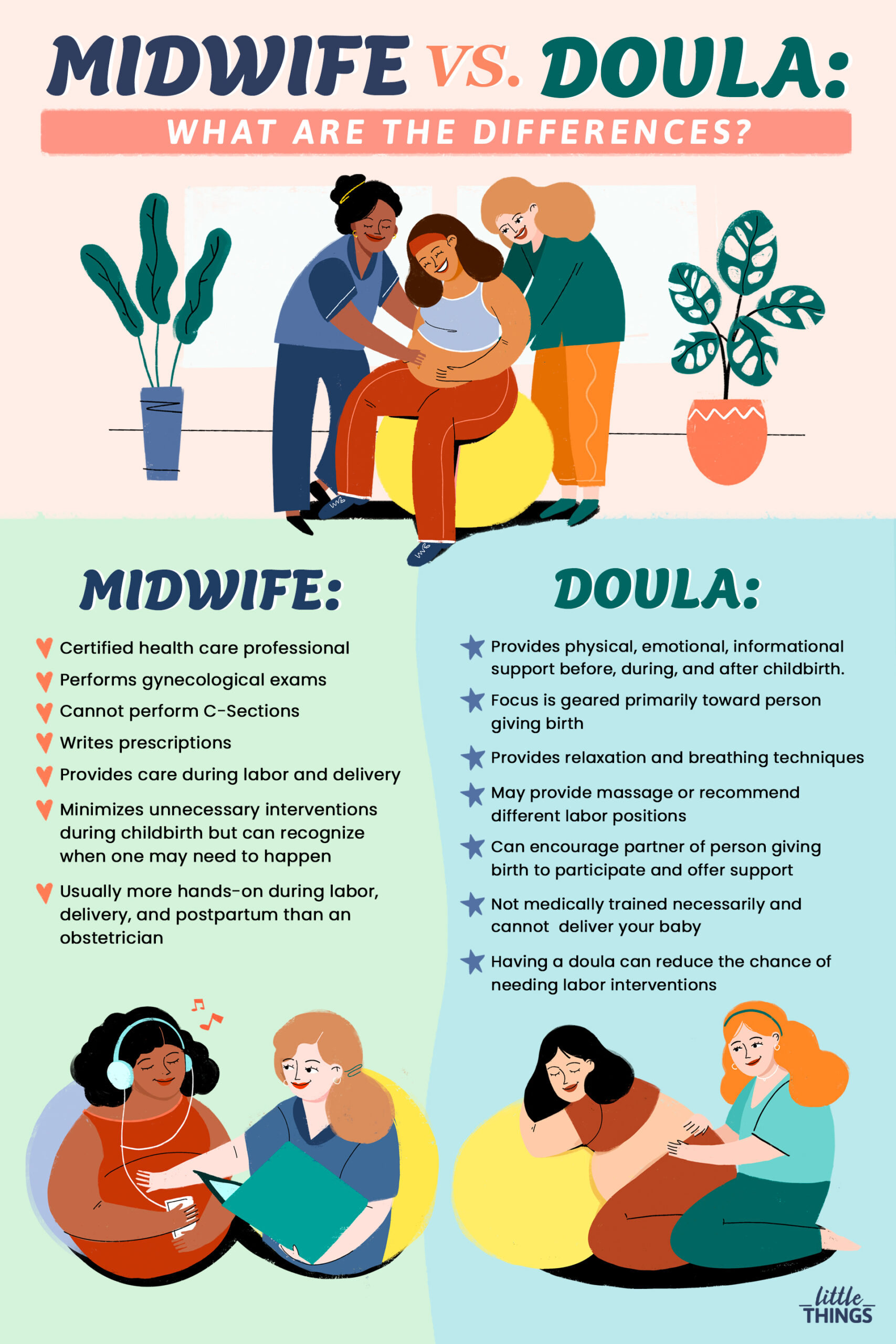
Childbirth can be equally exciting and nerve-wracking. While you’re excited to add a beautiful bundle of joy to your family, you’re also nervous and quite possibly scared about having a healthy pregnancy and a safe birthing experience.
That’s why it’s essential to realize that you can and should, if you desire to, have a team of support to help through your birthing process beyond your obstetrician.
Here are some ways having that support team can help you:
- Manage your fears associated with childbirth.
- Ease the process overall.
- Provide comfort.
- Meet your needs.
- Help you relax.
- Advocate for you throughout the birth process.
Types of Labor Support

You can have various supports by your side while giving birth, including a doula and a midwife. Here’s more information on the role each can play in your labor and delivery process.
Doula
A doula provides support to you before, during, and after childbirth. The support can be physical, emotional, and informational. A doula's focus is primarily on your needs so you can have the best birthing experience possible.
While a doula can help you before birth and during your postpartum period, their presence can be particularly beneficial during the labor and delivery process. They may remind you of relaxation and breathing techniques, give you a massage, or recommend different labor positions.
Your doula can also provide support by encouraging your partner, friend, or loved one who's present during the birth to participate and offer the best level of support possible.
However, a doula isn’t medically trained and can’t deliver your baby.
Midwife
A midwife is a certified health care professional who can perform gynecological exams, write prescriptions, and provide care during labor and delivery.
Your midwife’s duties will more closely align with that of an obstetrician. Still, their focus is on minimizing unnecessary interventions while knowing the signs that one is needed and referring you to an obstetrician to carry them out if necessary.
Here are some pros and cons of each option as you consider the best support for you.
Pros and Cons of Having a Doula as Birthing Support
Doula Pros
- Good doulas will have a working knowledge of labor and delivery and help you navigate the birthing process.
- A doula is wonderful added support if you don’t have a partner, friend, or relative who can join you during the process. This isn’t the only time you should have one, but it is more helpful in this case.
- If you’re going through part of the labor process at home, a doula can answer questions you have regarding what you’re experiencing.
- Your doula is at the hospital just for you, unlike your nurse in the labor and delivery ward, so you will have one-on-one support from beginning to end with a doula by your side.
- Studies show that having a doula can reduce the chance of needing labor interventions. This might be due to the consistent, personalized care and the emotional connection formed between the mother and the doula.
- The doula can take time to explain things in a way that your doctor or nurse might not if they're in a rush to work with different patients.

Doula Cons
- You have to ensure you choose a doula who has the level of skill and knowledge you need to support you through the labor and delivery process. Some newer doulas are still learning and cannot provide you with the level of support you need.
- You may find that your doula develops an idea of how your birth will go, and if you want to change it midway, they may not want to continue supporting you due to the change. That’s why it’s crucial to ensure that they’ll still be there for you even if you get an epidural or choose to have a C-section at the last minute.
- Hiring a doula can be expensive, and good doulas likely are, so you have to consider the financial aspect of having a doula for support.
Pros and Cons of Having a Midwife as Labor Support
Midwife Pros
- You will likely have a closer relationship with your midwife than you would an obstetrician, so you may feel more comfortable with them during labor and delivery, easing the process.
- A midwife will be more hands-on during labor, delivery, and postpartum.
- Your midwife’s goal is to help you take a more natural approach to childbirth without the use of unnecessary medical interventions. She will help you make informed decisions throughout your pregnancy through labor and delivery and beyond.

Midwife Cons
- If you require medical intervention such as a C-section, your midwife can’t perform one; however, if you have a nurse-midwife, they can assist during the procedure in the operating room.
- A midwife isn’t equipped to handle high-risk pregnancies that have a greater likelihood of requiring medical interventions.
- Your health insurance plan may not cover or reimburse midwifery services that occur outside of the hospital, so you need to check your policy in advance to determine what’s covered, especially if you're going to have a home birth.








